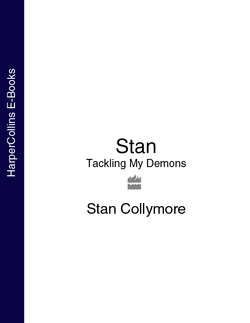Читать книгу Stan: Tackling My Demons - Stan Collymore - Страница 8
CHAPTER FOUR SOUTHEND AND FOREST: OPPORTUNITY KNOCKS
ОглавлениеBy the end of 1992, I knew I had to get out of Palace, even though it meant leaving the Premiership. I was nervous about going to Southend because they were struggling right at the foot of Division One. I knew I was going to be thrown in at the deep end and that if I didn’t swim, I would sink. I knew that it was possible their eccentric manager, Colin Murphy, who had managed a succession of lower league clubs, might get the bullet, and, if he did, the new manager might not fancy me. I knew I might find I had swapped a place in Palace reserves for one in Southend reserves.
But I was 21, and somehow I realised it was time to try and make my move. I knew I had the ability to do it, I just didn’t know about all the other things. I didn’t know if I could last 90 minutes. I didn’t know if I could sustain an amicable relationship with a manager. I didn’t know how the fans would react to me. By then I had played at Anfield and I had scored in the top flight, but in other ways I was still a novice. My apprenticeship at Palace had been valuable but they still saw me as a wide player, and I was desperate to return to being a central striker.
If you’re a striker, you’re a striker. It’s in your blood. It doesn’t matter how many times someone tells you you’re great at whipping crosses in. Johan Cruyff tried to do the same thing to Gary Lineker at Barcelona. Stuck him out wide on the right and tried to make the best predatory goalscorer that the England team has had believe he was a right winger. It did Lineker’s head in, just like it would have done with any striker. So when Colin Murphy told me I would be playing up front week in and week out, that was the most important thing for me.
Murph paid £80,000 for me. I was on £300 a week at Palace; that rose to £500 a week at Southend. I signed on a Friday and drove down to Roots Hall the next day for my first game. There’s a nice feel about Roots Hall. It’s not too far from the seafront, in a nice little area called Prittlewell, near where the tennis player John Lloyd grew up. Very middle class. But the club was floundering in Division One. It was trying to mix it with teams like Kevin Keegan’s Newcastle and another northeast giant, Sunderland, and in that kind of company it was struggling to punch its weight.
I met the lads and got changed. There was no fuss or hoopla. It was good not to have too much time to think about the move I’d made. I had a wander round on the pitch. Nice and flat. There were only about 3,000 fans there that day. Most of them were demonstrating against the chairman, Vic Jobson, because they were so unhappy with the way the season was going. They had begun to see relegation as a certainty, and I suppose the recruitment of some bloke from Palace reserves hadn’t done that much to fire their imagination or revive their enthusiasm.
Half an hour or so before the game, Murph’s assistant, Bobby Houghton, pulled me aside. He’d been a top line-manager abroad, a bit of a wanderer like Murph, and he knew players. He asked me if I was nervous and I said I was. ‘You shouldn’t be,’ he said. ‘You have got absolutely fuck all to worry about. I’ve seen some players but you can top the lot. You’ve got everything.’ Bobby went back to Sweden a couple of months later, where he had been most successful, but he made sure that when I went out at Roots Hall that day against Notts County I felt as though Southend had just signed Gary Lineker.
I scored after six minutes. A lad called Andy Ansah crossed the ball in from the right, and I kneed it up once and then volleyed it over the keeper. That goal set me up for everything that was to come in my career. It sounds ridiculous to invest so much importance in one strike at Roots Hall against Notts County, but it put me on a roll that didn’t end until my second season at Anfield. I never looked back after that. There was no agonising wait for my first goal at the club, no chance for the pressure to build on me and for me to start doubting what I had done. That goal was my passport to a new world.
